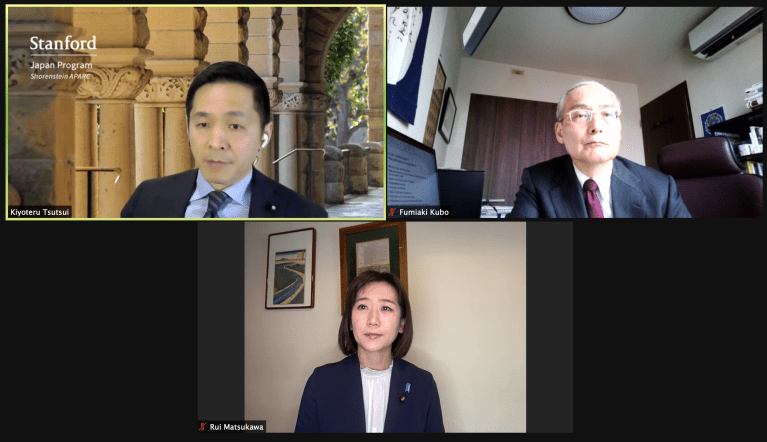The first few days of the Biden administration offers reassurance of a strong U.S.-Japan alliance, according to political and academic panelists at a Monday event on the future of the bilateral relationship.
Over the past seven decades, the U.S. and Japan have forged a close alliance. Under the Treaty of Mutual Cooperation and Security, Japan has allowed the American military to occupy bases while the U.S. is obligated to defend Japan. The relationship is built upon shared interests and values including democracy, political and economic freedom, prosperity, and stability in the Asia-Pacific region, according to the State Department.
Rui Matsukawa, a Liberal Democratic Party member of Japan’s House of Councillors, and Fumiaki Kubo, a professor of American government and history at the University of Tokyo, discussed hopes and challenges for the Biden administration in maintaining peace and security in the Indo-Pacific region. The discussion was moderated by Kiyoteru Tsutsui, director of the Japan program at Shorenstein Asia-Pacific Research Center.
Matsukawa sought to emphasize the importance of the U.S.-Japan relationship: “Our alliance has already a very stable foundation, not only just between the governments, but between the people as a whole.”
But the previous four years sank Japanese peoples’ opinions of Trump. According to a September Pew Research Center study, Japanese people’s confidence in former President Obama ranged from 60 to 85%, while Trump’s was between 24 to 36%. Though, notably, Japanese people’s ratings of President Trump was the highest of 13 surveyed countries, as 25% expressed confidence, according to the same study.
Kubo said the relationship between the two countries had been complex during the Trump presidency: “Because of the good personal relations between Trump and Prime Minister Abe, the bilateral relations were very good,” he said. “But there were some concerning elements with Mr. Trump,” according to Kubo, including reporting that the former president considered ending the U.S.-Japan Security Treaty.
Matsukawa said that the government will “work hard” to further strengthen the alliance to not only keep Japan safe, but also the Indo-Pacific. According to Matsukawa, peace and stability in the region depends on how well the U.S.-Japan alliance functions.
She said that she was “very much reassured” by Biden’s inaugural speech that emphasized unity and democracy. While Matsukawa said it was too early to judge, she is “very happy” with Biden’s first few days in office.
Kubo echoed optimistic sentiments: “Overall, the first days of the Biden administration is very reassuring.” Appointments, laws and actions taken by the new president are “positive” to Japan, Kubo said. For example, newly confirmed U.S. Defense Secretary Lloyd Austin reaffirmed America’s commitment to Japan in a phone call with Defense Minister Nobuo Kishi on Sunday.
According to Matsukawa, China filled the political vacuum left by the U.S. during the Trump administration.
She said that it is good that the “new administration is coming back to international framework,” including rejoining the Paris Climate Agreement and the World Health Organization.
Contact Anna Milstein at annamil ‘at’ stanford.edu.
